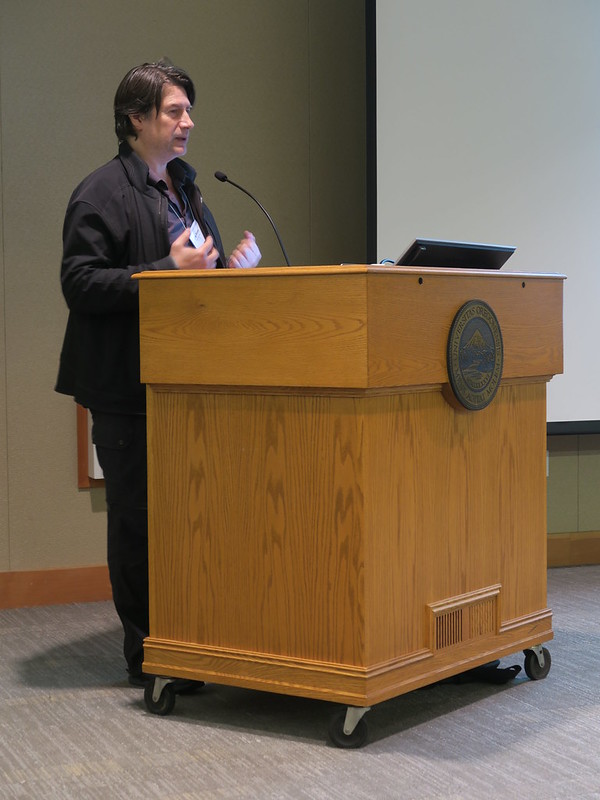Parallel breakout by @greg_bryant at @PUARLuo 2018 Conference.
This digest was created in real-time during the meeting, based on the speaker’s presentation(s) and comments from the audience. The content should not be viewed as an official transcript of the meeting, but only as an interpretation by a single individual. Lapses, grammatical errors, and typing mistakes may not have been corrected. Questions about content should be directed to the originator. The digest has been made available for purposes of scholarship, posted by David Ing.
Greg Bryant is editor of Rain Magazine.
Metaphysical contrast: Trying to move towards natural science, Christopher Alexander was headed that way
- Natural science, rather than performative or philosophical
Alexander’s research focus over time, came and went, over time
- What is good? This is a question with natural science
- How do we make more good happen?
Pattern was an English translation of Gestalt, which was a precursor to cognitive science
Contrast to a rhetorical approach
- Try to inspire people with words?
- Will natural science help them with better work?
- Alexander tried rhetoric, and tried natural science
- Natural science difficult to pick up: The Nature of Order, people aren’t getting it
- If want to propogate further, can we give people feedback? Can we do this with a computer?
The judgement of life as natural structure
- Life, harmony, we ARE a meter
- Involves brain and lower senses, but we don’t really know that much about ourselves
- It is within us
- What is out there that is making an impression on us?
- Questions being formed in the brain
- Distinguish between something natural, and something cognitive
If we’re the meter, and it’s biology, Alexander in Nature of Order volume 4, calls it Life Perception Faculty
- Have to examine ourselves
- This doesn’t mean the universe isn’t involved
Life:
- Climbing is innate
- Screwdriver is a technical term, composed, we’re able to correlate (Marcel Just and Tom Mitchell at Carnegie Mellon) across every language
- Aristotle: how can we understand each other in different languages, if we didn’t have the same brain
- Neuro-correlate studies
- When we recognize geometry, there are things being used
- Teaching natural structure, there are other things that are interesting, we have busy mental lives
- Life Perception Faculty makes this for us
Things that interfere have properties:
- Descartes, why don’t we see the triangle?
- There’s a cognitive mapping, in classical geometry
- Plato played to Meno, classical geometry was innate
We don’t understand nature from a natural science perspective
- Working scientists are narrow, they don’t think they know a lot in their fields
- An abandoned idea to understand nature, we have theories
- We don’t understand the world, we don’t understand ourselves
If there’s a meter, what stimulates us?
- Impression: say, I am experiencing a visual artifact, e.g. an optical illusion; we all experience that, we don’t examine the eye
- Can’t see the light in the eye as a physical effect, but we’ve accepted this in natural science that people say they see the after-impression
Asking which has more life?
- Then can tune
Covarying, e.g. pushing down the pedal on gas means we go faster
- Alexander used this process to find 15 properties
- Can be done with experiments
- Can find out which part of brains are in use; does it happen when we’re asleep and eyes are closed
- Have to have good experimental questions
Finding properties with covariance
- Need to do more to legitimize
- The meter in the brain
- In natural science, it’s not explored in the way the pattern language group does this
- Asking geometric questions: how do you know it’s a dead animal? How to you recognize that? An unanswer question.
Three factors in judging natural structure
- Innate
- Simulating (which can atrophy, so that don’t have access)
- Have natural laws of what it happens within it: It’s not because we have a gene, biophysics
To prepare someone to understand natural structure, have to get rid of a lot of stuff
- Cognitive structure
- Spectacle
- Symbols
- Language
- … Natural world doesn’t have all of these things
In trying to create the idea of centers, then how do you put all of these things aside?
Forest to timber exercise
- Enjoy the forest
- Then ask, how many trees in the forest, you use cognition, and then you look at the forest differently
- Asking more questions, people moving farther and farther away from the natural structure
Process was Alexander’s first pedagogical technique
- Unfolding sequences: imagine it’s like a flower growing, tree unfolding, so that you can do like natural structure
Gatemaker: 17 steps for a specific thing, to make a gate in any location
- Position –> opening –> …
- Ordered morphological and goal-specific steps until they get to the gate
- Doesn’t tell them what to do
- It’s on http://urbanology.com
Can use Gatemaker for construction
- Video on Youtube

